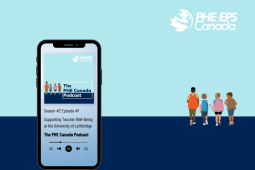Educational Research: Something Worthy of Physical and Health Education Teachers’ Consideration

Previously published Volume 87, Issue 1
Abstract
Educational research can be an influential form of professional development to expand and enrich teachers’ practice. Research has the potential to enhance Physical and Health Education (PHE) teachers’ knowledge to ensure their teaching is based on research/ evidence-informed practices and revise their pedagogy in light of new ideas. Although research engagement among PHE teachers may be an effective method of professional learning, uptake of educational research is often under-utilized among teachers. This article discusses educational research and explores the benefits and barriers of PHE teachers as research consultants. We offer suggestions for PHE teachers to engage in educational research with the aim of integrating research knowledge into practice. By developing teachers’ capacity, access, and use of educational research, there is potential to improve practice and participate in an ongoing process of professional development, self-improvement, and reflection.
The most important school-level factors influencing student achievement, perhaps now more than ever, are “effective” teachers and “high quality” teaching (BERA/RSA, 2014; Mourshed et al., 2010; OECD, 2005). Physical and health education (PHE) teachers, like all teachers, who are aiming for effectiveness and high-quality teaching ought to attend to sound research/evidence-informed teaching methods and strategies. One way for PHE teachers to ensure that their potential and/or already-adopted teaching methods and strategies are credible is to consult existing research. Indeed, research has demonstrated that a common characteristic of effective teachers is that they consult and try to apply research (Earl & Timperley, 2008; Ko & Sammons, 2012; Mincu, 2015). And yet, it has been reported that many teachers have little to no interest in educational research, and less than 20% of teachers read research journals (Ahuja, 2012). Given these observations, this article is intended to: (a) provide insight into what constitutes educational research and some traditional reasons teachers engage with such research; (b) identify potential benefits to consulting research, specifically for PHE teachers; (c) recognize the barriers that PHE teachers may face with regard to research; and (d) offer some suggestions for ways in which PHE teachers can easily connect with research.
What is Educational Research and Why Does it Matter?
Perhaps the best way to think of educational research is as a systematic endeavour to gain a better understanding of the practical aspects and problems faced by teachers, generally with a goal of finding ways to improve quality and/or efficiency in their teaching practices (Chandra & Sharma, 2004). Educational research is commonly conducted by scholars, often representing universities, who have an interest in teaching pedagogy. However, teachers can also lead or be a part of the research process (e.g., by helping to develop research questions, leading data collection, engaging as participant-observers) and there is a great deal of support for such undertakings (Charest, 2019; Cranton, 2018). It has been suggested that the three traditional reasons for a teacher to engage with educational research are: (a) personal purposes; (b) political purposes; and (c) school improvement purposes. Often these purposes are interconnected and overlapping, rather than simply discrete and isolated (McLaughlin et al., 2004).
All this being known, the majority of teachers that connect with research are not actively engaged in conducting it but, instead, are reading completed research to inform their teaching practices or to find answers to their own pedagogical questions (Cartwright & Hardie, 2012; Cordingley, 2008). Simply stated, teachers often access research to expand their knowledge and find evidence to support what they might do in their classes. The educational literature suggests that there are three forms of professional knowledge that teachers need in order to undertake their work: inferred knowledge/situated understanding, technical know-how, and critical reflection (Winch et al., 2015). Research has the potential to assist PHE teachers in increasing all of these forms of knowledge and a teacher who continuously increases their knowledge is more likely to ensure that their teaching is based on evidence of effective practice, and that teacher capacity is revised in light of new ideas and research evidence (Jin & Yun, 2010; Tatto, 2013). However, to reap the full rewards of research, a teacher needs to become research literate. That is, teachers need to be able to critically analyze research evidence and seek ways to resourcefully integrate research findings if they want to experience the full benefits that research might offer (Waring & Evans 2015; Wilson et al., 2013).

What are the Benefits of Continuous Engagement with Educational Research?
The contribution of research to teachers’ professional learning and development is highly significant (Cordingly, 2015). At the start of a teaching career, a great deal of the knowledge that is provided to aspiring PHE teachers during their academic studies (i.e., while completing a teacher education degree) is research-based. This should not come as a surprise considering that most institutions of higher education that produce future teachers are also major producers of educational research. Much of this research-based information provided to pre-service teachers during their teacher education programs will lay the foundations for their knowledge and their teaching practices when they become in-service teachers. Still, a foundation or starting point is truly all this should be. Education and educational practices are constantly evolving to better suit the needs of present-day students. Therefore, PHE teachers should also be evolving to ensure they are providing their students with the best possible, and evidence-based, education. To support teachers’ engagement with educational research beyond their undergraduate education, teacher preparation programs should prepare pre-service teachers/teacher candidates to engage in inquiry-based practice. This requires teacher education programs to equip future teachers with the capacity, motivation, and understanding to use research related skills to reflect and investigate what is and what is not working well in their own practice (British Educational Research Association, 2014). If the education community is truly committed to developing teachers who conduct professional inquiry, we as teacher educators must prepare teachers to engage with and be discerning consumers of research (Firth, 2016).
One of the major benefits of PHE teachers continuously engaging with the latest research from relevant academic fields is that it helps them update their technical subject knowledge (Winch et al., 2015). For example, being knowledgeable about terminology that emerges or gains popularity in the field of PHE (e.g., physical literacy over the past 15 years) can often be learned and understood by staying attuned to contemporary research. Additionally, new ideas or understandings about PHE-related subject content or trends in the area (e.g., advances in sexually transmitted infections [STI] treatment, physical fitness training principles, fad diets) can be clarified through interacting with research.
Continuous engagement with research does not only contribute to PHE teachers remaining current in subject knowledge, but it also helps them stay up to date with their pedagogical skills and professional practices (Winch et al., 2015). There are always new strategies for delivering content to students being developed and theorized, especially with advances in technology (e.g., consider educational and teaching apps). The question is, on what basis should a teacher use these and for what purposes? Is it just common sense? The problem with relying upon common sense in this manner, even when it seems entirely intuitive, is that it is wholly dependent upon individual advocacy (one’s own or others) for strategies based exclusively upon anecdotal evidence. As such, common sense is an unreliable basis for judgement, and one which ought to be scrutinised closely (Winch et al., 2015). Research, on the other hand, is able to provide teachers with valid and reliable evidence. Consequently, it has the potential to inform and improve teachers’ practices through providing possible reference points for making decisions about appropriate educational experiences and practical delivery strategies (Hattie, 2012). Therefore, research should be an integral part of PHE teachers’ continued professional development since it not only will refresh their knowledge of specific instructional techniques, but it will also help to ensure they are aware of “false” or discredited practices (e.g., static stretching prior to exercise) (Winch et al., 2015).
There are other lesser discussed benefits to PHE teachers engaging with research. One of these is that research has the ability to answer the “why?” behind best practices. Many PHE teachers may employ teaching strategies or delivery methods because they have seen them work for others or for themselves in the past. And yet, sometimes a strategy that has worked before may not be successful in a different situation or with a different group of students. It is at this point a teacher may ask, “Why is this the case?” Research can help answer these questions by explaining successful or unsuccessful interventions elsewhere, and then teachers can apply those lessons to their own situations (Cartwright & Hardie, 2012). One other final potential benefit of research for PHE teachers is that research can help explain teachers’ own personal feelings and emotions related to their career. Teaching can seem very solitary at points, but research focusing on PHE teachers’ emotions (e.g., Alves et al., 2019) can provide perspective and demonstrate that other individuals may have experienced similar feelings or emotions.
Why Might PHE Teachers not Consider Research?
If there are all these benefits to PHE teachers regularly interacting with research, then why is it not practiced by all teachers? The first (and most commonly cited) reason teachers do not regularly engage with research is a lack of access (Ahuja, 2012; Borg, 2009). This most likely can be attributed to the fact the majority of academic research published is done so in scholarly journals that charge a fee to access articles. A second major reason teachers may not regularly engage with research is due to a lack of time (Allison & Carey, 2007; Borg, 2009). In fact, around 60% of teachers have reported this as being a major barrier to reading research (Ahuja, 2012). PHE teachers in Canadian schools are likely to fall into this group due to the amount of time they spend leading extracurricular activities over and above their regular teaching duties. A third major reason cited for not consulting research is related to teachers’ perceptions that research is overly complex, too focused on theoretical ideas, and/or impractical in a diverse non-controlled setting (Cordingley, 2008; Gore & Gitlin, 2004). A final commonly cited reason teachers do not engage with research is that they receive minimal encouragement from their institution and administration to do so (Ahuja, 2012; Allison & Carey, 2007). This is an especially unfortunate barrier; research that has investigated schools as learning communities has indicated that the strength of a learning community is frequently determined by those in school leadership positions (Leidl, 2007).
How can PHE Teachers Access Recent PHE Research Applicable to the Canadian Context?
Teachers are often aware that research/evidence-informed practices are valuable and effective in their classrooms; however, identifying and accessing relevant and applicable research can be an overwhelming task. To help PHE teachers engage with and access Canadian research, we offer a few options to grow professional networks and interact with current research.
Connect with Physical and Health Education Canada (PHE Canada). PHE Canada is our physical and health education association committed to providing members with tools, information, and resources to achieve the vision of all children and youth in Canada living healthy, physically active lives. PHE Canada offers a useful website for PHE teachers looking to access recent scholarly work and establish networks and partnerships. There are a number of research/evidence-informed programs (e.g., At My Best, Teach Resiliency) and resources (e.g., PHE Learning Centre) housed on this site that aim to support PHE programming through research/evidence-informed practices.
Join the Physical and Health Education Canada Research Council. The PHE Canada Research Council is a national council supported by PHE Canada. The Research Council is comprised of university level teachers, researchers, and graduate students in the area of PHE advancing research on topics and issues in the field. Becoming a member of the PHE Canada Research Council allows access to research from PHE Canada national conferences and events, research project opportunities, grant and funding information, and monthly newsletters. The PHE Canada Research Council newsletter announces new publications and upcoming provincial, national, and international conferences and professional development opportunities. To become a Research Council member visit https://phecanada.ca/about/research-council.

Subscribe to and/or read Revue phénEPS/PHEnex Journal and/or Physical and Health Education Journal. Of the many PHE-related journals that exist, two are most related to the Canadian context. Both are also closely connected to PHE Canada and both are especially accessible to PHE teachers within Canada. The first, Revue phénEPS/PHEnex Journal, is an open-access journal, it can be accessed online with no required payments or passwords. The content within it is freely available to all. This journal: publishes empirical, theoretical, and methodological research, and position papers, as well as reviews and critical essays by Canadian and International authors. Research methodologies may be quantitative, qualitative or mixed method and may use data gathered through historical analysis, surveys, fieldwork, action research, participant observation, content analysis, simulations or experience. Articles most appropriate for PHEnex focus on pedagogical, social, cultural, philosophical, psychological, historical, sociological or management issues in physical education, health, dance, recreation, or leisure studies. (Revue phénEPS/PHEnex Journal, n.d., para. 1)
The second journal, Physical and Health Education Journal, is not open-access though some of its content is. The official journal of PHE Canada, Physical and Health Education Journal includes peer-reviewed educational research as well as much more practical articles designed specifically for PHE teachers. More specifically, Physical and Health Education Journal “provides a forum to highlight, analyze, discuss, and share many of the leading-edge teaching techniques, hot issues, and school successes in the fields of school health and physical education” (PHE Canada, n.d., para. 1). This “digital magazine” is offered to all PHE Canada journal subscribers.
Network/build connections with local researchers/scholars (e.g., from provincial PHE associations). All provinces/territories have specialist PHE organizations. Most of these organizations have researchers/scholars as executive members or as invited guests of executive teams. With such involvement, members of provincial/territorial specialist PHE organizations are able to engage with research(ers) through a number of possibilities. For example, decisions made by an executive group may be research/evidence-informed, presentations at specialist PHE organizations’ conferences may be made by the researchers themselves, and/or researchers might be enlisted to undertake new research or reviews of research on behalf of executive teams.
Connect with Researchers at Neighbouring Universities. Aside from these sorts of possibilities, PHE teachers can also very easily engage with local researchers/scholars without also being a close part of their specialist PHE organizations. That is, almost every university with a teacher education program has a dedicated PHE researcher. Oftentimes, when PHE teachers reach out to these researchers, they are met with instant replies and invitations to collaborate. Just as some PHE teachers are searching for ways to bring research into their practice, all PHE researchers are searching for ways to make sure their research finds its way into teachers’ practice. In many ways, these overlapping ambitions can lead to immediate and sustained professional relationships, both informally and formally.
How can PHE teachers engage in meaningful research/evidence-informed professional development opportunities?
There are a number of associations and support networks in which teachers can engage in professional development opportunities. Several national and international organizations have created opportunities and platforms for teachers to increase knowledge, improve pedagogy, and enhance teaching practice. These offerings include in-person or virtual conferences and online professional development workshops/courses. Further, post-secondary institutions offer graduate programs affording teachers opportunities to engage in research as well as conduct their own research. Although this list is not exhaustive, it serves as a starting point to foster research engagement and support PHE teachers’ continuing research/evidence-informed professional development.
Attend PHE Conferences. Conferences bring together scholars and practitioners in the field of PHE covering a variety of topics designed to share knowledge and engage in professional development and related research. The PHE Canada Research Forum is an annual conference held in conjunction with PHE Canada’s National Physical and Health Education Conference. The Research Forum is led by the PHE Canada Research Council and provides opportunity to connect researchers and practitioners with an interest in PHE. At the conference, current research is shared, relevant issues are discussed, and professional networks established. Internationally, conferences such as Shape America National Convention and AIESEP contribute to the development and impact in the field of physical education through the dissemination of quality research. Attending any in-person conference, like the ones mentioned here, do come with travel, time, and financial considerations. However, on-line PHE conferences where such considerations are less of a concern do exist (i.e., no travel required and often lower or no registration fees). One of the best examples of these is the #PhysEdSummit that is hosted by PHYSEDagogy. This event regularly includes numerous research-focused sessions led by top scholars in PHE from all over the world. You can participate live or check out their YouTube Channel for archived sessions. Attendance at PHE conferences provides a setting to gain knowledge from and engage with current research, as well as develop connections with both researchers and other PHE practitioners.
Other Research/Evidence-Informed Online Professional Development Opportunities. PHE teachers can take advantage of numerous online (and often free) virtual professional development opportunities that have a research base or focus. These sessions provide an efficient way to engage in professional development and become part of a growing online PHE community. The PHE Canada Spotlight Series presents online professional development opportunities through virtual workshops. The purpose of these workshops is to provide free quality learning experiences for teachers. Topics of the Spotlight Series have included: building physical literacy through dance, sexual health education, and alternative environment activities in PE. All Spotlight Series workshops are recorded and shared on the PHE Canada website. The PHE Canada Spotlight Series, however, is just the tip of the online iceberg with regards to research/evidence-informed PHE webinars and courses. Some other free PHE webinar providers include ConnectedPE and Human Kinetics. ConnectedPE offers on-demand courses and training opportunities in the area of PHE. This platform houses hundreds of online courses on various topics, permitting the ability to complete the course at an individual pace. Similarly, one of the largest publishers of PHE-related academic textbooks, Human Kinetics, offers free PHE webinars through their website to anyone who signs up for a free account. Most of these webinars are led by academics and discuss research/evidence-informed practices to assist with teaching PHE. Beyond these free online options for research-related professional development, there are also many online sources (e.g., PE Central; PHE Canada) that provide research/evidence-informed professional development opportunities for a fee (e.g., courses, certifications, webinars, workshops, etc.).

Massive Open Online Courses (MOOCs) can offer another free research/evidence-informed professional development opportunity for PHE teachers. These are post-secondary level, online courses that anyone can enroll in at no cost. They often provide certification and many are delivered by leading academic institutions. In 2017, for example, the first MOOC related to PHE was hosted by the University of Birmingham and over 6,700 individuals enrolled in the course. There are also numerous universities around the world that offer free online courses related to PHE. The website FreeStudy.com is a great resource to help individuals search out such courses.
Complete a graduate level degree in PHE. Returning to university to obtain a graduate degree (e.g., Master of Education) may be one of the most ideal ways for PHE teachers to meaningfully (re)engage with educational research. Indeed, in many provinces/territories, teachers who complete a graduate degree are afforded a higher status teaching license and/or salary—both of these things a testament to the “added value” that comes with post-graduate teacher training. These graduate programs afford PHE teachers many opportunities to be critical consumers of educational research as well as select opportunities to be producers of research. Such research production opportunities include bona fide research studies and resultant theses as well as smaller scale site-based practitioner inquiry projects (e.g., through action research). A number of Canadian universities now have entire cohorts of PHE teachers within their graduate programs, so that PHE teachers can be fully immersed in a community of like-minded peers examining the discipline most important to them. Moreover, some of these cohort programs are taught, partly or fully, through an online format—making these sorts of learning activities much more accessible. These PHE cohorts can be found across the country, for example, at the University of British Columbia, the University of Alberta, St. Francis Xavier University, and Memorial University.
Concluding Comments
Throughout this article we have provided insight into PHE-related research and the important role it can play for individuals teaching PHE in schools. By developing teachers’ capacity, access, and use of educational research, there is potential to improve practice and participate in an ongoing process of professional development, self-improvement, and reflection. Still, knowing something is important is only valuable if we make effective use of that knowledge. Consequently, PHE teachers at all points in their career need to be encouraged to engage in and with research, and actively supported to develop the confidence to do so. As a starting point, PHE teacher education programs play an important role and should provide pre-service teachers with the knowledge and skills to access and implement research into their practice—to ensure practitioner inquiry becomes a normalized part of professional development. However, support for research engagement among in-service PHE teachers is just as important. School communities need to value and provide opportunities for PHE teachers to engage in and with research. Furthermore, a conscious effort needs to be made by the academic community producing new research, to ensure that findings of value are made freely available, accessible, and as usable as possible for PHE practitioners (British Educational Research Association, 2014). To that end, for all those individuals/organizations responsible for organizing and/or creating professional development opportunities for teachers, we implore them to make experiencing and engaging with educational research more accessible, more relevant, and more interesting to participant’s (teacher’s) professional lives. As long as the onus remains with individual teachers to prioritize research knowledge it will remain a challenge to embed more broadly and deeply in the profession the important research findings that can guide and inform better teaching practices.
Annually, there is a plethora of PHE-related research being conducted around the world and this work has the potential to greatly benefit PHE practitioners who connect with it. Moving forward, the onus will be shared among researchers, academic institutions, and PHE teachers themselves to ensure this potential is realized.
References
Ahuja, S. (2012). Research results for quality schooling: Bridging the gap between research and practice. MIER Journal of Educational Studies, Trends and Practices, 2(2), 206–214.
Allison, D., & Carey, J. (2007). What do university language teachers say about language teaching research? TESL Canada Journal, 24(2), 61–81.
Alves, M., MacPhail, A., Queirós, P., & Batista, P. (2019). Becoming a physical education teacher during formalised school placement: A rollercoaster of emotions. European Physical Education Review, 25(3), 893–909.
BERA/RSA (2014). The role of research in teacher education: Reviewing the evidence. Interim report of the BERA-RSA inquiry. British Educational Research Association.
British Educational Research Association (2014). Research and the teaching profession: Building the capacity for a self-improving education system (Final report of the BERA-RSA Inquiry into the role of research in teacher education). Accessed 12 August 2020 https://www.thersa.org/globalassets/pdfs/bera-rsa-research-teaching-profession-full-report-for-web-2.pdf
Borg, S. (2009). English language teachers' conceptions of research. Applied Linguistics, 30(3), 358–388.
Cartwright, N., & Hardie, J. (2012). Evidence-based policy: A practical guide to doing it better. Oxford University Press.
Chandra, S. S., & Sharma, R. K. (2004). Research in education. Atlantic Publishers & Distributors.
Charest, B. (2019). Navigating the shores: Troubling notions of the teacher as researcher. The International Journal of Critical Pedagogy, 10(2), 19–44.
Cordingley, P. (2008). Research and evidence-informed practice: Focusing on practice and practitioners. Cambridge Journal of Education, 38(1), 37–52.
Cordingley, P. (2015). The contribution of research to teachers’ professional learning and development. Oxford Review of Education, 41(2), 234–252.
Cranton, P. (2018). Teachers as researchers: Participatory and action research. In V. C. X. Wang & T. G. Reio, Jr. (Eds.), Handbook of research on innovative techniques, trends, and analysis for optimized research methods (pp. 82–98). IGI Global.
Earl, L., & Timperley, H. (Eds.). (2008). Professional learning conversations: Challenges in using evidence for improvement. Springer.
Firth, J. (2016). Research engagement for the school teacher and its role in the education community. Education in the North, 23(2), 161-166.
Gore, J. M., & Gitlin, A. D. (2004). [RE]Visioning the academic–teacher divide: Power and knowledge in the educational community. Teachers and Teaching, 10(1), 35–58.
Hattie, J. (2012). Visible learning for teachers: Maximizing impact on learning. Routledge.
Jin, J., & Yun, J. (2010). Evidence-based practice in adapted physical education. Journal of Physical Education, Recreation & Dance, 81(4), 50–54.
Ko, J., & Sammons, P. (2012). Effective teaching: A review of research. Executive summary report prepared for CfBT. University of Oxford, Department of Education.
Leidl, R. (2007). Starting somewhere: Understanding the impact of QDPE for in-school administrators. Physical and Health Education Journal, 72 (4), 26–27.
McLaughlin, C., Black-Hawkins, K. & McIntyre, D. (2004). Researching Teachers, Researching Schools, Researching Networks: A Summary of the Literature. Cambridge: University of Cambridge
Mincu, M. E. (2015). Teacher quality and school improvement: What is the role of research? Oxford Review of Education, 41(2), 253–269.
Mourshed, M., Chijioke, C., & Barber, M. (2010, November 1). How the world’s most improved school systems keep getting better. McKinsey & Company, https://www.mckinsey.com/industries/social-sector/our-insights/how-the-worlds-most-improved-school-systems-keep-getting-...
OECD. (2005). Teachers matter: Attracting, developing and retaining effective teachers. http://www.oecd.org/document/52/0,3343,en_2649_39263231_34991988_1_1_1_1,00.html
Physical and Health Education Canada. (n.d.). PHE Journal. Retrieved November 20, 2020, from https://phecanada.ca/connecting/phe-journal
Revue phénEPS/PHEnex Journal. (n.d.). Focus and scope. Retrieved November 20, 2020, from https://ojs.acadiau.ca/index.php/phenex/about
Tatto, M. T. (Ed.). (2013). The teacher education and development study in mathematics (TEDS-M): Policy, practice, and readiness to teach primary and secondary mathematics in 17 countries, https://files.eric.ed.gov/fulltext/ED545287.pdf
Waring, M., & Evans, C. (2014). Understanding pedagogy: Developing a critical approach to teaching and learning. Routledge.
Wilson, A., Akerlind, G., Walsh, B., Stevens, B., Turner, B., & Shield, A. (2013). Making ‘professionalism’ meaningful to students in higher education. Studies in Higher Education, 38(8), 1222–1238.
Winch, C., Oancea, A., & Orchard, J. (2015). The contribution of educational research to teachers’ professional learning: Philosophical understandings. Oxford Review of Education, 41(2), 202–216.









